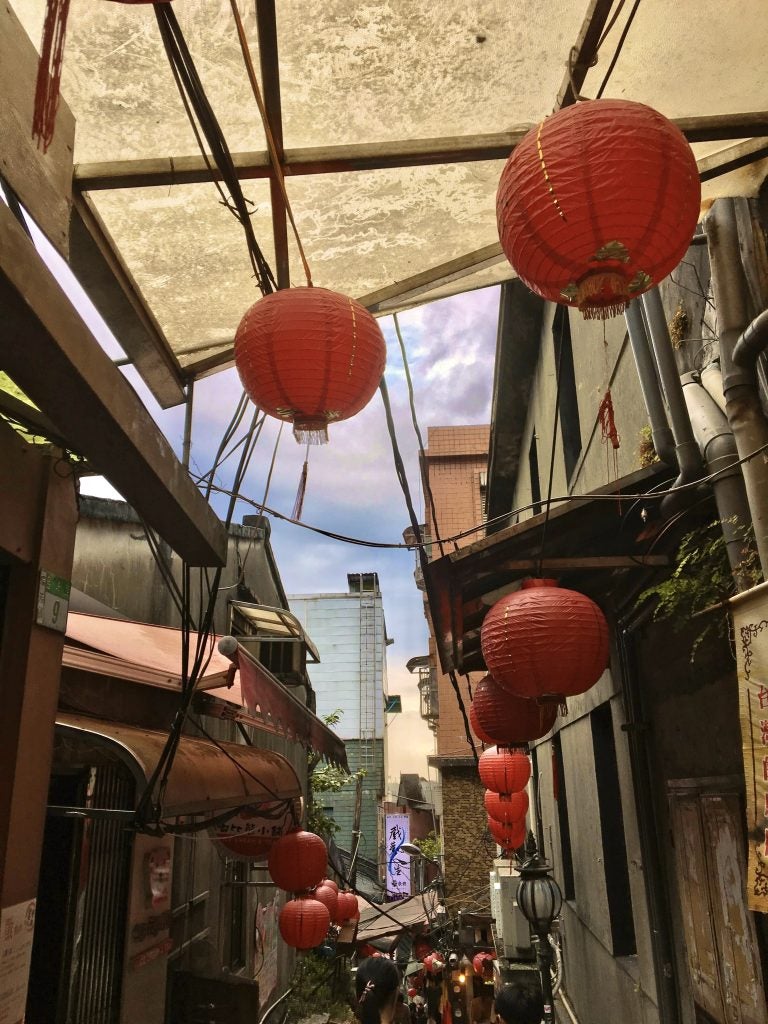Spotlight on Chinese-Language Programs: Student Experiences in Language Learning
Posted in News Story | Tagged Asia, China, Chinese, Language Learning, Taiwan
One of the best parts of studying abroad is the opportunity to improve your foreign language skills. With the addition of CET Taiwan to OGE’s list of offerings, we’re taking a deeper look at the experiences of Chinese-language learners abroad, through excerpts from our blog.

Students build up their Chinese abilities in a number of ways. First and foremost, Chinese-language programs offer intensive, customized language classes focused on rapid language acquisition.
“In language classes of six or seven people at their largest (at their smallest, nobody but you and your professor), there is no room for mistakes beyond vocabulary and grammar structures (which are inevitable and even welcome by our teachers). In class, teachers call on students at will, leaving us no choice but to follow our class’ progression. And, sure enough, that split-second when you think about the dumpling restaurant at the center of your lunch plans will coincide with one of the many times your teacher asks you to use a complicated grammar structure in a sentence. 请再说一次。。。”
Andrea Moneton (SFS ‘18), “Adapting to a Chinese-Style Education.” Intensive Language and Culture in Beijing, China (ACC Hamilton), Spring 2017.
But language learning goes beyond the classroom, too. Interaction with local residents lets you practice your skills in “real life,” and facilitates intercultural understanding.
“Everywhere I went—restaurants, the school cafeteria, markets, and malls—people were eager to engage with me once they knew I was not from China. When it took me time to order food and buy items, people were more than willing to wait and help me find the words.”
Millie Kim (SFS ‘21), “Ni hao Beijing!”. Intensive Language and Culture in Beijing, China (ACC Hamilton), Summer 2018.
Even simply going out with fellow classmates for a fun karaoke night can prove to be an exercise in language practice.

“In those five hours, I realized that despite moments of frustration in and out of the classroom, my Chinese really has improved in the time I’ve been in Taipei. I can look up and add to the music queue without asking a friend to help me – and this is a bigger deal than it sounds since you know how to write and be able to count the strokes of the first character of the target song title. I can read (more) at the speed of the glowing blue words across the screen. Thinking in terms of word meanings comes much more naturally than simply memorizing sounds, which was how I processed Chinese music in my earlier years. It’s truly amazing how much more fun karaoke is when you are literate.”
Stephanie Lio (COL ‘12), “Lessons in KTV.” Intensive Chinese Language and Culture in Taipei, Taiwan (CIEE), Fall 2010. (Note: CIEE Taiwan is no longer active, but students have the option of CET Taiwan.)
And don’t forget about food––not only is it key to understanding the culture, but food symbolism also turns out to be an interesting way to engage with some vocabulary.
“Some foods symbolize concepts like longevity, luck, good fortune, and wealth. For instance, the character for fish “鱼”(yu) is pronounced the same way as the word “余” (yu) for fortune. On special occasions and holidays like New Years, Chinese families eat fish and wish each other good fortune for the coming year: “年年有余” (nian nian you yu) is wordplay for “may every year end with surplus” or with fish.”
Millie Kim (SFS ‘21), “Eating on a Lazy Susan.” Intensive Language and Culture in Beijing, China (ACC Hamilton), Summer 2018.
Some Chinese-language programs even offer immersion opportunities like living with a host family (for example, Accelerated Chinese Language in Shanghai, China (CIEE)), or interning in a Chinese-speaking work environment (for example, CET Taiwan: Intensive Chinese Language in Taipei, Taiwan (CET). Not all programs require previous Chinese language experience––you can look in our brochures to see what their requirements are.
Of course, you don’t have to wait to go abroad to practice Chinese outside of class. Georgetown’s Department of East Asian Languages & Cultures regularly hosts its Chinese Language Table, an hour of informal conversation in Chinese.
In short, Chinese-language programs offer some of the best opportunities to enhance your reading, writing, and speaking skills, from formal instruction in the classroom to casual conversation with local residents as you explore the food, culture, and more!
For more Chinese-language programs, see the following list of programs offered by Georgetown University’s Office of Global Education:
- Accelerated Chinese Language in Shanghai, China (CIEE)
- Advanced Chinese Studies at Peking University (CIEE)
- Business, Language and Culture in Shanghai, China (CIEE)
- CET Taiwan: Intensive Chinese Language in Taipei, Taiwan (CET)
- China in a Global Context in Shanghai, China (CIEE)
- Intensive Chinese Language in Beijing, China (CIEE)
- Intensive Chinese Language in Harbin, China (CET)
- Intensive Language and Culture in Beijing, China (ACC Hamilton): Semester
- Intensive Language and Culture in Beijing, China (ACC Hamilton): Summer
- Middlebury School in Hangzhou, China
- Middlebury School in Kunming, China
- The Beijing Center
- IFSA Study in Shanghai: International Business
- IFSA Study in Shanghai: Social Sciences
